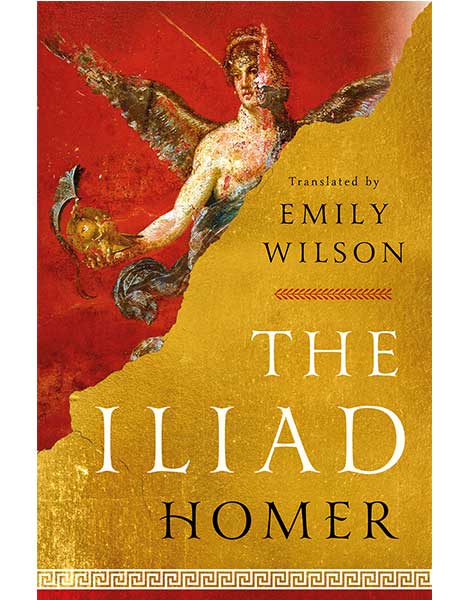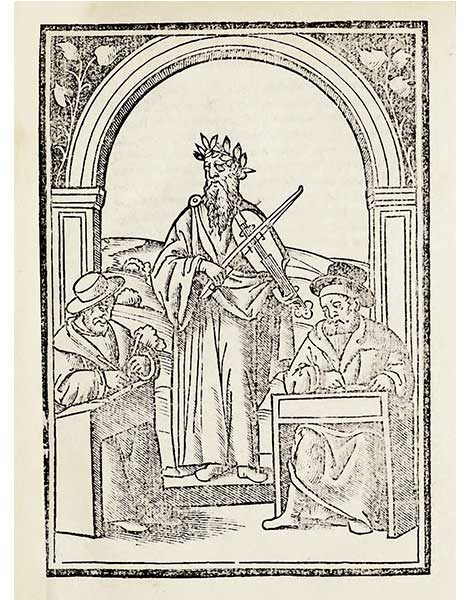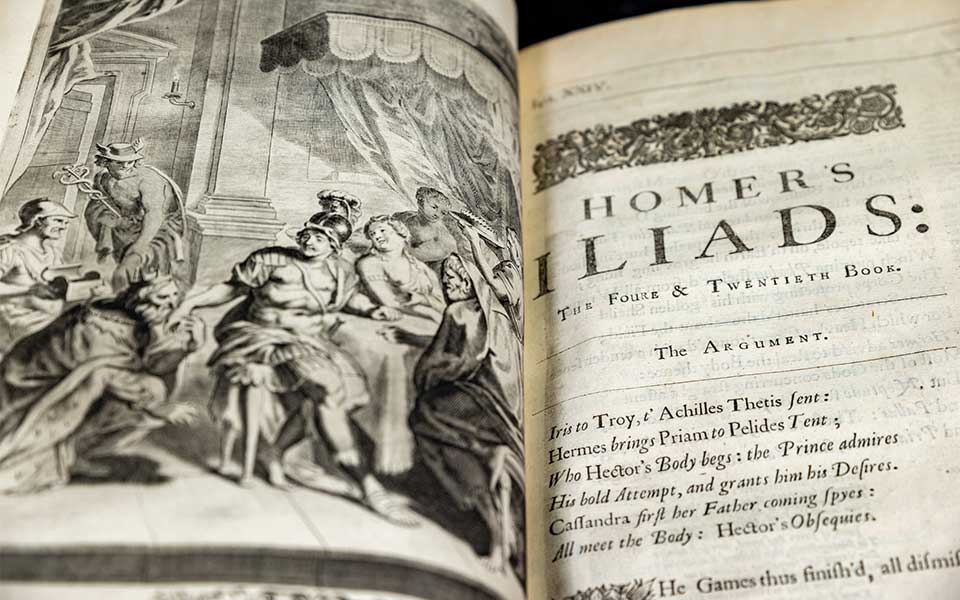Emily Wilson, a distinguished professor in the Department of Classical Studies at the University of Pennsylvania and the first woman to translate the Odyssey into English, carries traces of the Homeric world on her body. Her left arm bears tattoos of Xanthos and Balios, the two immortal horses that pulled Achilles’ chariot in the Trojan War. She also has a tattoo of a hippocampus, the sea-horse associated with Poseidon; an owl, the symbol of the goddess Athena; and an arrow on her calf, which might reflect Achilles’ vulnerability, a reminder of the mortal destiny that he shared with all humans.
There’s no doubt of the hold that Homer, the blind poet of the nostos, or homecoming, exerts over Emily Wilson. A few months ago, she achieved another milestone by presenting an elegant, modern, lively, and dynamically paced translation of the Iliad into English. Now, she feels “a sense of loss because there isn’t a third Homeric epic. I comfort myself because I can keep re-reading Homer, and there’s never an end. And I’m also doing a retelling of Trojan myths that people may not be as familiar with. And it comforts me because it means I don’t have to be away from the world of Homer.”
Since the first translation of the Odyssey into English in 1616, there have been 60 other versions. Wilson’s translation garnered critical acclaim for its boldness and her talent; the New York Times included it in their list of the 100 most notable books for 2018. Her words have been compared to “raindrops on a metal roof,” her poetry was said to read “like a thriller,” and her translation was praised as having “cinematic qualities.” For both epics, Wilson chose the iambic pentameter for the flow of the text but used everyday words that connect the reading audience with the heroes’ actions and their meanings. For example, Nausicaa addresses her father, King Alcinous, as “Daddy,” and Hecuba suggests to her son Hector to “have a drink” to relax after a tough battle. “As somebody who’s spent the last ten years working on translations, I’m constantly having to reinvent myself in my work and see how I can speak as this person now that I’m doing this speech or reinvent myself as this other character within this other speech. That makes me feel very close to Odysseus because I’m always reinventing myself now,” she says, admitting that she “was struggling to find the right voice” when she started each translation.


© Gennadius Library, American School of Classical Studies at Athens
“To tell the truth”
For Wilson, choosing the right word in every instance is crucial. “I don’t need to take a position on how the Homeric epics were written, whether by one or more authors or if they were constructed fragmentarily or completed in a specific period. However, I must be able to explain why I decided to choose a word when the ancient sources indicate more than one option.” Most of the remarks she received concern her adoption of “harder” words such as “slaves” instead of the more moderate choices of other translators who use “servants” in the same context. “The duty of a translator is to tell the truth however they can, to convey the emotions a text gives them, and also what it says on the basic level.” The words used in a translation should reflect “the complexities of communities that have a lot of hierarchy within them, where some members of society are extremely powerful. If you use language that suggests the enslaved people aren’t really enslaved and they couldn’t leave any time they wanted, the story isn’t clear, and what the poem is saying is not clear.”
Controversies erupted on Twitter (now X) regarding her decision to translate the word “polytropos” as “complicated.” What does this imply? Could Odysseus be complex, multifaceted, or, even worse, problematic, as are the possible interpretations of the word in modern times? In her introduction to the Odyssey, she lists all his identities: Stranger, pirate, carpenter, king, athlete, beggar, husband, lover, father, son, fighter, liar, leader, and thief. Does she particularly like the cunning king of Ithaca? “I love Odysseus and love all the main characters. But it doesn’t have to be that I think he is a nice person or I should marry him. I don’t read like that. He is a fascinating character, and I see elements of myself in the way that he’s always interested in telling another story, adopting another voice, disguise, or reinventing himself in different contexts.”
The conversation turns to how the meaning of a word evolves over time. The word “hero” in ancient Greece corresponded to a warrior with exceptional abilities; today, it refers to someone who sacrifices for the common good. “It can be tempting to think ancient heroes must have been like saints. But they weren’t. They were people who were very important within very famous stories, often associated with a particular place and often closely associated with a god or gods. But that’s very different from saying they saved the world or were Superman.”
In a speech delivered in the Gennadius Library in Athens last October, she noted the difference between words that change to keep up with social developments, like what it means to be a man or a woman in each era, and those that remain unchanged over time, like the concepts of pain or mortality. Does she think her “language” contributed to introducing the Homeric epics to a broader audience? “We know that within the classical period, the Homeric stories were part of children’s education and adults’ entertainment and religious festivals. Our culture focused too much on the present as the only time humans have been human. In returning to the Homeric poems, we get both a sense of how alien and different the past was and, at the same time, how fully human the humans are in those poems. They’re so full of emotion. All of us have felt very angry or felt devastated by grief. Even just the themes of celebrity culture, and why is everyone so obsessed with being the best? Or the themes of partisanship, and why is this tiny community full of people who hate each other? Why is our culture so full of rage? We live in a cultural moment across the globe where people move from one place to another, either to make war or to force [people] from their homes through the migrant crisis. Troy is, of course, a world which would be soon wiped out.”

© Gennadius Library, American School of Classical Studies at Athens
A question of complexity
She first encountered the Homeric epics at the age of 8. For a school performance, she played the goddess Athena. The class troublemaker would play Odysseus and the school principal, Polyphemus. “I was thrilled; it wasn’t just about poking the principal’s eye out; the story had captivated me.”
She believes that every adaptation aimed at introducing children to the Homeric world is beneficial. However, she disagrees with Hollywood film adaptations, like the one directed by Wolfgang Petersen with Brad Pitt as Achilles and Orlando Bloom as Paris. “It’s a shame not to represent Homer’s emotional and psychological complexity. So many screen adaptations suggest it’s all about throwing big spears and shouting a lot. And it is about throwing spears. But it’s not just about throwing spears. It’s also about what happens inside people and between people.”
Last summer, on a visit to Greece with her daughters – the middle one is named Psyche – she negotiated how many museums they would see. She revisited the National Archaeological Museum and, “of course,” went to the Acropolis Museum. “Once they’re all in college, I will spend more time in Greece.” While she recited Homer in the original with Erasmian pronunciation in her Athens speech, she avoided modern Greek, which she admits she speaks “very badly.” She also confesses her passion for Greek vegetarian cuisine, the various types of wild green pies, tzatziki, and Greek salad, and she remains amazed at the countless ways Greeks cook eggplants.
When asked about her favorite spot in Athens, she doesn’t hesitate to identify it as “the hill behind the Acropolis, the old Areopagus Hill. You can get this view of the whole city where you’re not actually in the Acropolis, where the queue takes hours. And you can think about Demosthenes giving his speeches.” What fascinates her about Greece is that history “is all around you. There are so many archaeological sites that are so open, and you can wander around among the ancient ruins. History surrounds you; I also love how the train goes through the old Agora. It’s amazing.”
During her summer vacation, she visited Hydra, Aegina and Ithaca. “I was expecting to be disappointed because there’s the Cavafy poem where Ithaca has nothing left to give you; it’s presented as this barren place where Ithaca has given you the journey and can’t give you something else. But Ithaca is great and so under-visited. I stayed in the north, and it felt like going back in time, back to antiquity, because there were all these herds of goats wandering around, basically the descendants of the goats that come up in the Odyssey. And the few humans around don’t seem to always be on their cell phones. They’re just living a quiet, rural life taking care of goats. And that was great.”











